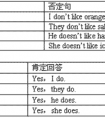按要求改写下列句子。1. The boy with a football's Tom's brother. (否定句)The boy with a football.2. Can the uncle in the car play rugby well? (肯定句)The u-五年级英语
1.这些动词跟其他另一个动词一起做并列谓语时,否定不转移。如:
I believe and hope he won’t do that. 我相信并且也希望他将不会那样做。
I feel and admit that we are not foolish. 我觉得并且也承认我们并不愚蠢。
2.用于疑问句时,否定不转移。如:
Do you think it is not going to rain? 你认为天不会下雨吗?
Don’t you believe that he has done a good thing? 难道你不相信他做了一件好事?
3.用作插入语时,否定不转移。如:
Li Lei, I think, won’t be angry with you. 我想李蕾不会生你的气。
Tom, I suppose, won’t be against it. 我猜想汤姆不会反对。
Mike, I believe, hasn’t seen the film. 我认为迈克没有看这场电影。
4.动词前有其他副词修饰时,否定不转移。如:
I really don’t think it’s necessary for us to go there now. 我的确不认为我们有必要去那儿。
I feel strongly that he shouldn’t do such a thing. 我强烈地认为他不应该做那样的事。
5.动词为非一般现在时或主语不是第一人称时,否定不转移。
I thought that he wouldn’t come back soon. 我原以为他不会回来得这么快。
She didn’t believe that he became a good boy. 她不相信它变成了一个好孩子。
He thinks that he isn’t fit for the job. 他认为他不适合这件工作。
He doesn’t believe that what we told him is true. 他不相信我们告诉他的事是真的。
6.当宾语从句中含的否定为“not……at all”、“not a little”、“not a few”、“not enough”、“can’t help”等固定搭配时,否定不转移。如:
I think that he doesn’t know it at all. 我想他对那一点也不知道。
I suppose that it is not enough to remember the words if you want to learn the language well. 我认为如果你想把这门语言学好,那么只记单词是不够的。
I believe that you can’t help singing our national anthem when you win the first place in the Olympic Games. 我相信当你在奥运会上获得第一名时你会情不自禁地唱起国歌来。
7.当宾语从句中含“no”、“nothing”、“nobody”、“nowhere”、“hardly”、“seldom”、“little”、“few”等否定词或半否词时,否定不转移。如:
I believe that nothing can make me give it up. 我想任何事情也不能使我放弃。
I think that no one can escape if the ship sinks in the sea. 我认为如果这艘船沉入海底的话,那么谁也逃不掉。
I suppose that he is a man of few words. 我猜想他是一个言语不多的人。
考点名称:单数名词
单数名词:
主要用来表示“一个”东西的概念。两个及其以上就应用复数名词来描述。
例如单数可数名词:man,river,book,glass,desk,cup,road,car,eye,foot,tree,bird,girl,boy英语上名词按可数与否可分为可数名词和不可数名词。
可数名词按数目又可分为单数名词和复数名词两类。
注意:不可数名词没有复数形式,如water(水)。
考点名称:复数名词
- 复数名词:
指名词的数量大于“一”,如:two books, some students
名词变复数:
1、一般情况下,词尾加s。如:students,apples,bags,trees,books,brothers
2、s,x,z,sh,ch等结尾的名词,词尾加es。如:glasses,boxes,brushes,matches
3、y结尾的名词分两种情况,“辅音字母+y”结尾的名词,将y变为ies;
“元音字母+y”结尾的名词,直接在词尾加s。
以辅音字母加y结尾的名词,变y为i加es:cities,babies,enemies。
以元音字母加y结尾的名词,如:boys
4、f或fe结尾的名词,一般将f或fe变为ves。如:leaf-leaves, wife-wives, knif-knives
5、规则名词:foot→feet,tooth→teeth, child→children,man→men, woman→women,
sheep→sheep,deer→deer, mouse→mice. - 名词变复数规则:
巧记以f、fe结尾的可数名词复数情况
构成方法
例词
读音
一般情况
在词尾加-s
desk→desks
map→maps-s在清辅音后发/s/
day→days
girl→girls-s在元音和浊辅音后发/z/
以s,x,ch,sh结尾的词
在词尾加-es
bus→buses
box→boxes
watch→watches
fish→fishes-es发/iz/音
以辅音字母加-y结尾的词
变y为i再加-es
family→families
factory→factories
party→patries-ies发/iz/音
以元音字母加-y结尾的词
在词尾加-s
day→days
boy→boys
key→keys-s发/z/音
以f或fe结尾的词
变f或fe为v再加-es
knife→knives
life→lives
wife→wives
half→halves-ves发/vz/音
以辅音字母加-o结尾的词
在词尾加-es
potato→potatoes
tomato→tomatoes
hero→heroes-es发/z/音
以元音字母加-o结尾的词
在词尾加-s
radio→radios
zoo→zoos-s发/z/音
妻子骑牛拿起刀,wife,calf,knife↑
追得贼狼满街跑,thief,wolf→→→变f或fe为v,再加es
碰倒架子丧己命,shelf,self,life↓
手帕树叶半空飘。handkerchief,leaf,half↓ - 英语名词单数变复数口诀:
(一) 规则变化
名词单数变复数,直接加 -s 占多数;
s, x, z, ch, sh 来结尾,直接加上 -es;
词尾是 f 或 fe,加 -s 之前先变 ve;
辅母 + y 在词尾,把 y 变 i 再加 -es;
词尾字母若是 o,常用三个已足够,要加 -es 请记好,hero, tomato, potato。
(二) 不规则变化
男人女人 a 变 e,鹅足牙 oo 变 ee;
老鼠虱婆也好记,ous 变 ic;
孩子加上 ren,鱼鹿绵羊不用变。
【解说】
1. 英语名词有单数和复数的区别,单数表示“一”,复数表示“多于一。”
名词由单数变复数,多数是规则的变,直接加 -s,例如:book → books, girl → girls。但以 -s, -z, -x, -ch, -sh 结尾的名词,变成复数时加 -es,
例如:bus → buses, buzz → buzzes, box → boxes, watch → watches, brush → brushes
2. -f(e) 结尾的名词单数变复数歌诀:
① 树叶半数自已黄,妻子拿刀去割粮,架后窜出一只狼,就像强盗逃命忙。
② 妻子持刀去宰狼,小偷吓得发了慌,躲在架后保己命,半片树叶遮目光。
例如:leaf (树叶,叶子),half (一半),self (自已),wife (妻子),knife (刀子),shelf (架子),wolf (狼), thief (窃贼,强盗) 和 life (生命),
这些名词变成复数时,都要改 -f (e) 为 v,再加 -es。
3. -f 结尾的名词直接加 -s 变复数歌诀:海湾边、屋顶上,首领奴仆两相望;谁说他们无信仰,证据写在手帕上。
例如:gulf, roof, chief, serf, belief, proof, handkerchief,这些名词变复数直接加 -s。
注:scarf(围巾;披风) 可以先改 f 为 ve 再加-s,也可直接加 -s。
4. 辅音字母 + y 结尾的名词,把 y 变 i 加 -es。
- 最新内容
- 相关内容
- 网友推荐
- 图文推荐
上一篇:I ____ any bread. [ ]A. wantB. don't wantC. like-三年级英语
下一篇:按要求改写下列句子。1. The boy with a football is Tom's brother. (否定句) The boy with a football _____________ _____________ _____________.2. Can the uncle-五年级英语
零零教育社区:论坛热帖子
| [家长教育] 孩子为什么会和父母感情疏离? (2019-07-14) |
| [教师分享] 给远方姐姐的一封信 (2018-11-07) |
| [教师分享] 伸缩门 (2018-11-07) |
| [教师分享] 回家乡 (2018-11-07) |
| [教师分享] 是风味也是人间 (2018-11-07) |
| [教师分享] 一句格言的启示 (2018-11-07) |
| [教师分享] 无规矩不成方圆 (2018-11-07) |
| [教师分享] 第十届全国教育名家论坛有感(二) (2018-11-07) |
| [教师分享] 贪玩的小狗 (2018-11-07) |
| [教师分享] 未命名文章 (2018-11-07) |

![They ___________ like sweet things. [ ]A. don't B. aren't C. isn't-五年级英语](http://www.00-edu.com/d/file/ks/4/1/63/2019-08-31/small9cd523a0de82eff49e4ea07f34ddaa2f1567192691.gif)


![That's ___________jeep. It's a car.[ ]A. a not B. not C. not a D. not an-六年级英语](http://www.00-edu.com/d/file/ks/4/1/63/2019-08-31/small906a4f337e361f331d9a3de0dac7f65e1567192681.gif)

